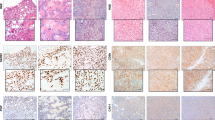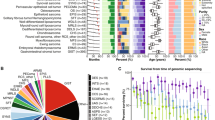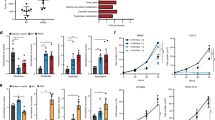Abstract
We have established ten transplantable human soft-tissue sarcoma (STS) xenografts grown as subcutaneous tumours in the nude mouse. Nine xenografts originated from patients that needed chemotherapy in the course of their disease. The xenografts were tested for their sensitivity to maximum tolerated doses of five anti-cancer agents. Growth of treated tumours was expressed as a percentage of control tumour growth and a growth inhibition > 75% was measured for doxorubicin in 20% of the STS xenografts, for cyclophosphamide in 30%, for ifosfamide in 20%, for vincristine in 20%, whereas etoposide was not effective in the STS xenografts. In three out of ten STS xenografts MDR1 mRNA was detectable, but this was not related to the resistance against doxorubicin, vincristine or etoposide. Topoisomerase IIalpha mRNA expression levels did not reflect sensitivity to doxorubicin or etoposide. In all STS tissues, however, these levels were lower than topoisomerase IIalpha mRNA in a drug-sensitive human ovarian cancer xenograft. Glutathione concentrations and the activities of glutathione S-transferase, glutathione peroxidase and glutathione reductase were not related to resistance against the alkylating agents or doxorubicin. Of interest, in all STS tissues, glutathione S-transferase pi was the predominant isoenzyme present. In conclusion, chemosensitivity of the STS xenografts reflects clinical response rates in phase II trials on the same compounds in adult STS patients. Relatively low levels of topoisomerase IIalpha mRNA may partly account for intrinsic resistance against, for example, doxorubicin. Additional factors must contribute to moderate responsiveness to alkylating agents.
This is a preview of subscription content, access via your institution
Access options
Subscribe to this journal
Receive 24 print issues and online access
$259.00 per year
only $10.79 per issue
Buy this article
- Purchase on Springer Link
- Instant access to full article PDF
Prices may be subject to local taxes which are calculated during checkout
Similar content being viewed by others
Author information
Authors and Affiliations
Rights and permissions
About this article
Cite this article
Boven, E., Pinedo, H., van Hattum, A. et al. Characterization of human soft-tissue sarcoma xenografts for use in secondary drug screening. Br J Cancer 78, 1586–1593 (1998). https://doi.org/10.1038/bjc.1998.727
Issue Date:
DOI: https://doi.org/10.1038/bjc.1998.727
This article is cited by
-
Patient-derived xenograft models in musculoskeletal malignancies
Journal of Translational Medicine (2018)
-
Human osteosarcoma xenografts and their sensitivity to chemotherapy
Pathology & Oncology Research (2004)



